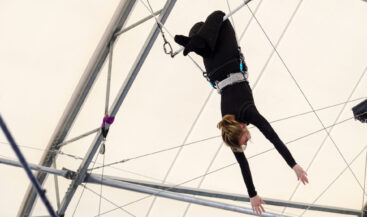If you were to ask me what scenarios make me most uncomfortable, I’d have to say it’s ones that involve small talk, mingling with strangers, needing to “network”, and large events where I know close to no one that top off my list. You could also likely add phone calls. I’m great in emails, texts, on social media, even old school letters, but the actual interaction with other humans can feel exhausting. I’m not anti-social by any means, but I need to be mindful of where I spend my energy.
For a long time I tried to be different, feeling like I was the problem. It’s easy to internalise the message that we don’t “belong”, encouraging us to be different – to be more like everyone else. It’s no surprise we end up feeling flawed and exhausted. Over time, however, I learned that there are many others like me. We are introverts and the aforementioned scenarios would likely drain many of our energy, contrary to our extrovert counterparts who thrive on external interactions. Unfortunately, for as long as these terms have existed (1920’s), the message has always been the same: how can introverts be more extroverted?
In a world that idealises extroversion, it can feel challenging to be otherwise. There is a lot of fear and nervousness around being socially accepted. We find ourselves scared of doing things wrong or making mistakes that might lead to feeling rejected. Introverts can be outgoing, but the key is that we need to reenergise ourselves alone. We need time for reflection; to process and recalibrate. Stimuli and social interactions can overwhelm an introverted person, causing us to appear as if we have shut down or closed ourselves off when in reality we just need time to go inwards.
Though introversion is considered to be a personality type, coined by Carl Jung, some may be surprised to learn that it is in fact biological, due to the sensitivity to dopamine experienced by introverts. This happens because introverts actually have less dopamine receptors than extroverts do, which is why certain stimuli overwhelms us while to someone else it would be giving them a dopamine boost. In other words, introverts and extroverts have differences in the brain. So trying to change one or the other is futile. And naturally both work on a spectrum, with many experiencing overlapping qualities.
It’s not about changing the way we are but rather finding acceptance and tools that better support our wellbeing, helping us to get by in an extroverted world. Here are just a few ways in which you can do this:
- Don’t force yourself to be different. Changing how others interact with introverts starts with how we treat ourselves. We don’t need to change, we just need to get better at understanding and communicating our needs. And we need to tackle our limiting beliefs about ourselves. Confidence stems from an acceptance of who we are and a belief in our right to be that way. It’s time to let go of the expectations of others and to allow others to know the real you. Take time to journal to get to know yourself better. Notice the stories you tell yourself about the way you are and if they don’t serve you, rewrite them! Use affirmations to remind yourself daily that who you are is great, and exactly who you need to be.
- Know where you excel and focus on that. We find our energy in being alone. Especially in nature. Take advantage of that to tap into your self-awareness. Where else do you feel your energy replenished? Introverts tend to be more self-reflective and as such are more in tune with their needs. We can also be more creative as we may be less inclined to do what everyone else is doing. Hone in on these traits to be productive doing the things you love as you embrace environments that allow you to thrive and tap into your flow state!
- Know yourself and your limits. Because we can be so self-aware, we need to use that awareness to help us set healthy boundaries to protect our energy. We engage socially on different terms, so honour your needs by protecting your limits while surrounding yourself with people who respect them! Remember that before you set boundaries for others, you have to first set them for yourself. What can you be doing to protect your own energy? Whether it is getting more sleep, taking breaks from social media or nit participating in gossip – boundaries start with you.
- Mental preparation. Mentally prepare yourself for situations that you know will likely deplete you. Knowing ahead of time how the situation will likely make you feel will help you prepare ways in which you can protect your mental capacity for socialisation. Have an exit strategy for events that are overwhelming. Talk to friends, family and colleagues about ways in which they can be supportive of your needs – and vice versa. Create agreements over having expectations to help navigate your experiences.
Many introverts found themselves thriving during Covid 19 lockdowns as they had an excuse to remain at home and lacked a general need for social engagement that extroverts thrive on. Now that the world has gone back to “normal”, you may be feeling pressure to be more social, which can be a lot for an introvert. Even social media, which can act as a safe haven for introverts to connect, comes with its challenges as feeds full of fun parties can leave us feeling socially inadequate.
Remember that it is ok to be the way that you are, and that you are not alone. Because I have not only struggled with introversion most of my life but also been diagnosed with ADHD, I thought you might be surprised to learn that there have been studies done that confirmed that more than half of the diagnosed people with ADHD within the study were actually introverts, despite ADHD being associated with more extroverted tendencies (and this is possibly why so many go undiagnosed!) The more you know about yourself, the more understanding and acceptance you will find. There are so many aspects of ourselves that we struggle with that are in fact physiological and are things that we should not be ashamed of, but instead seek to normalize. Own who you are. When you own who you are, you stop fearing how you will be perceived.





